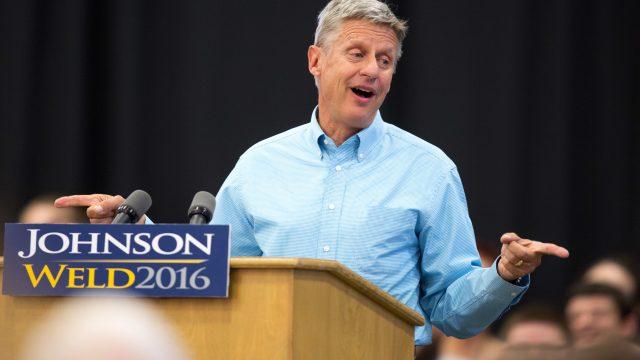
If you’re like me—one of many Americans currently trying to choose between the political equivalents of a rock and a hard place—you may have been excited by the prospect of a third voice on the stage of the presidential debates to come. I think many have been receptive to the idea that another candidate couldn’t possibly make things worse. In fact, a whole movement has sprung up around getting the former New Mexico governor and Libertarian presidential nominee Gary Johnson the right to appear on stage. He was seemingly on track to earn that privilege by polling at close to 15 percent of the vote. The debates are already set to be more akin to wrestling title matches than the dignified discourse of a modern republic, so what harm could a third voice possibly do? It turns out, perhaps, quite a bit.
In a recent MSNBC interview, Johnson needed a prompt regarding Aleppo, the war-torn city in Syria. He went as far as to utter the question, “And what is Aleppo?” Far from being the answer to a Jeopardy question, this response might well be the last words of Johnson’s presidential campaign. Aleppo has received national and international attention for the bloody conflict of a civil war, with the United States and Russia supporting opposing sides. It would be difficult for anyone with his or her head not firmly entrenched in the sand to be unaware of the city’s existence and importance, let alone a potential contender for president of the United States. The future of Aleppo has major humanitarian and strategic implications, which makes the error all the more shocking. Not only does this blunder raise questions about Johnson’s foreign-policy qualifications, it raises questions about his qualifications as a candidate in general.
Johnson said that he blanked and that he’s actually quite well-versed in the politics of the Syrian crisis. I don’t necessarily doubt this, yet we college students know all too well that it isn’t how much you think you know before the test, but rather what you’re able to produce on the spot that counts. I don’t expect politicians to be superheroes with perfect responses to every question. And I realize that with the multitude of issues facing modern America, some things may get lost in the wash. But Johnson’s gaffe pulls the door wide open for Donald Trump and Hillary Clinton to deflect from real issues and questions and focus on him.
With this misstep, Johnson has firmly claimed his place in the sideshow that is this election cycle. Imagine how screeching a halt the debate would come to if he froze up like that on stage. It also isn’t difficult to imagine Trump trying to make his foreign policies sound sane in contrast to Johnson’s ignorance. Johnson could have provided a stabilizing voice in a battle of fire and ice, but now he’s likely to be little more than a convenient distraction for the two main candidates. Better for Trump and Clinton to duke it out on stage against each other one-on-one with no added distractions.
I had high hopes for the potential of a third-party candidate in these presidential debates set to be fought between two dramatically polarizing candidates. I wanted to believe that a legitimate third-party figure could be more than a protest vote. I defended Johnson when people made those predictions. I argued that perhaps between all of the bluster about tax returns and emails, Johnson may have actually gotten a cogent word in.
But this gaffe has allowed me to move on from that perhaps too-ambitious hope. I’ll file it as yet another disaster in this dysfunctional race and steel myself for the shouting matches to come. Disillusionment has been a key theme of this election cycle and it’s hard to dispute that this misstep has just added another disappointment to the pile. I think Johnson’s lasting impression with most people will be his look of bewilderment when asked about one of the most critical international issues facing our next commander-in-chief.
It’s truly too bad because I believe that, like myself, many people feel that the two-party system in America has become unwieldy and intractable. The spectrum of issues facing Americans today is as complex as ever, even while the parties grow more isolated and obstinate. We could have used a legitimate third voice in this race, if only to provide a different perspective from the party politics we have come to expect.
Worse still, I fear that Johnson’s flub may have damaged the respectability of third-party candidates not only in this race, but moving forward. This election cycle was the perfect opportunity to show how broken the two-party system is, and a promising third-party possibility may have just knocked himself out of serious consideration. It’s been nearly a quarter-century since a third-party candidate made it to the broadcast debates, yet we need viable outside options and voices now more than ever. For Johnson to have come this close only to regress sets a poor precedent for the hopes of third-party candidates of the future.
Featured Image by Scott Morgan / AP Photo